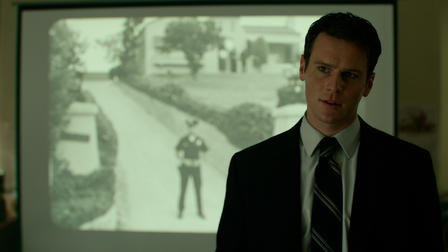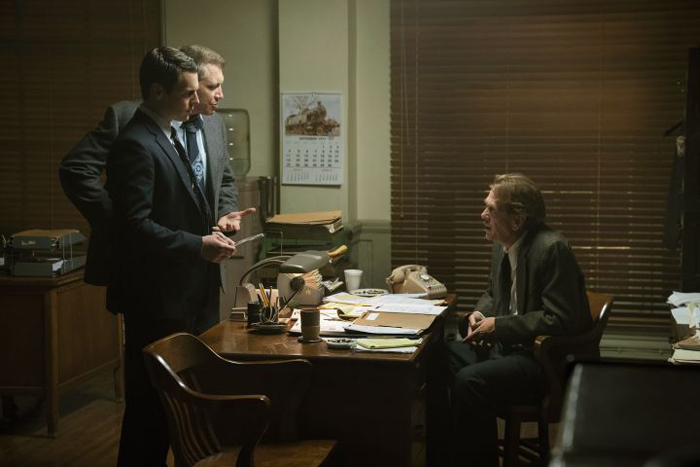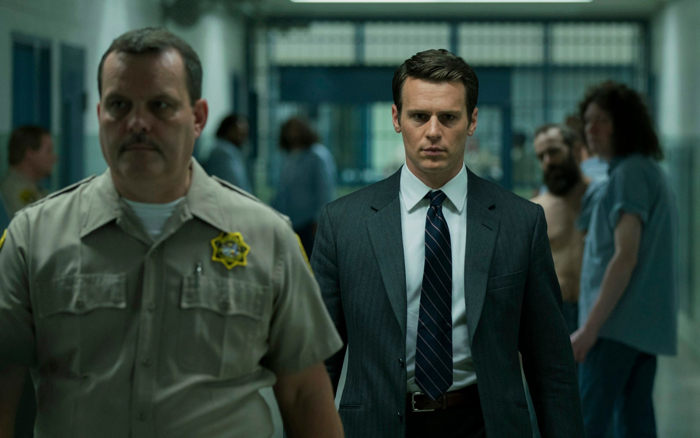First this. Before any subjective analysis or half wrought opinions, this, in bold, italicized letter, in flashing lights if you can imagine (and we both know you can): any review of Mindhunter will be largely meaningless if you have not watched the show before reading it. Now, if you would like to take sixty minutes and watch the show first, then come back to me. I would understand. I’m not mad at you. If, however, you don’t mind reading what will be a relatively dense and surgical dismantling of what is a complicated and, at points, baffling program without the tools necessary to fully engage in the conversation, I’m cool with that, too. I am writing this to you from only the halfway mark, and already I have too much to say, too many thoughts to ever hope to convey in any length shorter than “Russian novel.” So go to the bathroom, quickly, grab a snack, nestle in. The next time we speak, I’ll have finished episode one, and we’ll have a chat, you and I.

Prepared as we are, let us establish well and loudly the happy fact that Mindhunter does not, so far, feel like a high budget Hannibal rip-off, a fear that was, for a spell, consuming. There are similarities beyond their shared DNA – Mindhunter is built around the work of the man who inspired aspects of Jack Crawford and Will Graham – but they are elusive and perhaps best shelved for later in this review, if not later in this greater conversation. Mindhunter is singular; it is unto itself. Before I can go into the extremely idiosyncratic nature of episode 1, I should probably lay out the bare bones of what we are dealing with here.
Jonathan Groff plays strange, ethereal psychology nymph, Holden Ford. He’s introduced trying to talk down a returned veteran (we can assume from the timeline established that he is suffering from PTSD, post Vietnam,) who believes he is invisible and wants to speak to his wife. Ford wants to save both the soldier and the hostages, but is still heralded victorious when the man shoots himself without hurting any of the civilians. Within these first three minutes, we learn a great deal about Ford simply by watching him interact with both the soldier and the system that he works within; Ford is humane, kind. Empathetic. He views the man with a gun as a human being, worth saving, while the law enforcement agency he is a part of sees only a threat. Something that is expendable, and deviant.
From here, we watch Ford muddle through his daily life; he teaches classes, tries to introduce psychological framework to a rather antediluvian system that is interested in remaining black and white. Ford is interested in more; he wants to expand the psychology he knows and the empathy he possesses to understand the criminal mind, and convinces his superiors to send him to audit courses in psychology – provided he is willing to try to recruit for the FBI while doing so.

He comes into the sphere of Bill Tench, who, in a delightful subversion of expectations, looks like an old school tough guy, but is intelligent and receptive. He and Ford form a sort of tour of psychological enlightenment, designed to introduce what we know as (but have not yet been called on the show) profiling techniques. They land in a town where a mother and son have been brutally murdered, and local law enforcement solicits their help. This is the elevator pitch (provided the elevator you’re riding is in the Burj Khalifa building, and you’re taking it from tip to taint) and intriguing enough on its own. But it is also barely the surface of what makes this first episode such an alien, but fascinating, opening salvo.
Let’s start with Groff. Anyone who has done their homework about the series (don’t worry, if you haven’t, I have for us both, and you’re welcome,) knows that Ford is supposed to be nearest related to Jack Crawford. But the media presentation of Jack Crawford has always erred closer to the strong, silent archetype; yes, he is brilliant. Yes, he is open to new ideas. But at the end of the day, Crawford always feels like part and parcel of a different time. Ford feels like a fey Will Graham. He is deeply empathetic, so deeply invested in a notion of doing the right thing, that he has dismantled the concept of evil. There is a great deal of feinting towards discussions of performative masculinity (more on that later) and Ford stands as a subversion of that. The characteristics that define him are starkly contrasted against a proud stock of men who consider psychology to be a greater risk than guns (when Ford asks a young recruit why he would rather use his firearm than try to talk down a suspect, the young man replies that they “seem safer,”) and there is a strong suggestion that those same qualities color him as effete in the eyes of his colleagues. Groff plays Ford with a delicate hand. Not tortured just yet, but standing with his feet well on that ledge. There is action in the show, but he is what you are watching. And well, too, that he is as compelling as he is, because the show is intensely dialogue heavy. The conversations range somewhere between True Detective season 1 and a college lecture on psychology.

Initially, I was distracted by the writing – not necessarily what you would call good – until I began to realize that this show has some strange tricks up its sleeve, many of which I haven’t figured out yet. It is meta – in unexpected ways – to return to the scene with the young recruit, we see how these young men’s behaviors shift and change when they are performing imagined hostage situations. How they seem to forget how real people actually act. There are multiple allusions to the movie Dog Day Afternoon, in particular, a scene where Pacino asks to see his wife – the same demand that the soldier in the opening scene of episode one makes. What I was hearing as tin-eared dialogue is, in fact, self aware dialogue. And if, perhaps, it is a bit on the nose to have Groff and his paramour-to-be trying to have a conversation about heady subjects while a band plays raucously in the background, it is also ambitious in a way that few shows typically are. Mindhunter could easily lean into the procedural aspects you would expect from its lineage and pedigree; instead, it becomes something much weirder and more self-referential. When we watch Groff watching recruits re-create a crime scene that they either saw or heard about, it is undeniable that the meta-fiction is not only intentional, it is purposeful. Is it simply showing off a sort of technical prowess? Or is it an examination of how a watching eye can alter our lives and our behaviors? I’m not sure yet.
I see that I have reached a length that longs to be unforgiving, so I’m going to wrap episode one here, with the caveat that there is a great deal more that I’m hoping to explore more in episode two, and perhaps the overall course of the season. If you are watching at home, today’s themes are: performative masculinity, the nebulous nature of identity (twice Ford is referred to as a spy and makes allusions to his own time undercover. This is clearly relevant and would that I had several hundred more words to delve into it!), the primitive notion among the male law enforcement that psychology is a direct threat to their heterosexuality. If you’ve watched and would like to flail with me in the comments, I’d be thrilled. And if it was all a little too heavy for you, here’s a link to Jonathon Groff singing “Satisfied” from Hamilton to Lin-Manuel Miranda:
See you soon, for episode 2!
